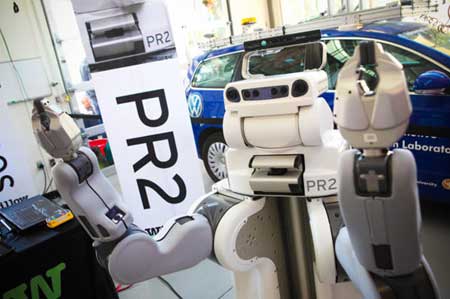 |
|
In celebration of National Robotics Week, Stanford hosted the Silicon Valley Robot Block Party on Wednesday, hosting some of the best in research, industrial, and homemade robotics. |
|
When I walked onto the Stanford University campus this week and into the Volkswagen Automotive Innovation Lab, I was greeted by a short, gray robot waving his two long arms -- he was looking for a high-five. All around me robots of all sizes were roaming the floor. I was trapped -- in the future. Billed as the Silicon Valley Robot Block Party and held during National Robotics Week, the party yesterday was a celebration of human-robot interactions. Developers, researchers, and makers shared tips and explored the very ideas of what a robot can be and do. The people I met here are interested in robots on many levels. There were startups pitching their businesses, home-brew builders looking to have some fun, high-school kids building competition robots, and Ph.D. students just exploring. That high-fiving robot? It's the creation of Willow Garage, a founding member of the Silicon Valley Robotics group that hosted the block party. In 2010, Willow Garage announced it would be delivering 11 of its $400,000 PR-2 robots free to research groups. The program, however, which began as an open-source platform intended to encouraged roboticists to collaborate on creating a universal robot language, has quickly evolved. After just a few years, following an announcement in February, Willow Garage says it is shifting toward becoming a profitable and self-sustaining company. What's next in the lives of robots? That's the question everyone here wants to answer. Even after the PR-2's 2010 release, within a year the stereoscopic cameras that provided the PR-2's vision were replaced with commercially available hardware -- Microsoft's Kinect, highlighting the rigorous pace of innovation. The commercial, off-the-shelf technology available to each of us today, as NASA has discovered, is fast, smart, and constantly upgraded. And as the evolution of robotics quickens, maybe that's what events like National Robotics Week and the Robot Block Party, are all about. There's a sense that though robots are already a great part of our lives, we are still in the early stages of robotics innovation. Things are evolving quickly. For that reason, a marketplace of ideas such as this is incredibly important. People and ideas are being connected. Across genres, robotics hobbyists are talking to startups, educators are talking with industry, and students are talking to engineers -- all with a focus on the future -- envisioning a future where automation is smarter, machines are more useful, and everyone has the technical skills to live side by side with our robot friends. |
這個星期,我來到了美國斯坦福大學校園,當我走進大眾汽車創新實驗室時,一個灰色的身材矮小的機器人揮舞著兩條長長的手臂歡迎我的到來,并想與我擊掌。 各種大小的機器人在我的周圍走來走去,我似乎置身未來。 “硅谷機器人街區聚會”在“國家機器人周”期間舉行,昨天的聚會是為了慶祝人機交互。開發人員,研究人員和制造者探索了機器人未來的模樣和功能,并分享了一些相關的技巧。參加這個聚會的人都或多或少對此感興趣。一些創業公司在尋找商機,而普通民眾只是想在這里找些樂子,高中生正在舉辦機器人比賽,博士生在進行科學研究。 機器人也會擊掌慶祝?這是Willow Garage公司的創作成果,這家公司是硅谷機器人組織的創始成員之一,同時也主辦了這次的聚會。2010年,Willow Garage公司宣布將把11個價值40萬美元的“第2代智能機器人”免費贈予研究小組。該項目最初是作為一個開源平臺,旨在鼓勵機器人專家合作創建一種通用的機器人語言,目前已經得到了迅速發展。短短幾年后,Willow Garage公司在二月份發出一項聲明后宣稱,它正轉而成為一家具有盈利性和自立性的公司。今后機器人又會出現什么樣的革新呢?這里的每一個人都想知道答案。 “第2代智能機器人”在2010年發布后,一年之內,為機器人提供視覺的愿景立體相機便迅速被市售硬件——微軟的Kinect所取代,這突出了技術創新的步伐如此迅猛。如今,我們每個人都可以享受到商業化的現成技術,而且這些技術發展迅速,充滿智能化,且不斷升級換代。 機器人革新越來越快,也許這就是人們舉辦國家機器人周和機器人街區聚會的原因。從某種意義上說,雖然機器人已經是我們生活重要組成部分,但我們仍然處于機器人創新的早期階段。萬物都在迅速變化發展,充滿創意的市場非常重要。 在這里,人們互相交流最新創意。不同行業的人們相互交流,例如,機器人愛好者與創業者,教育家與企業家,學生與工程師,都在聚焦未來。他們期待自動化變得更加智能,機器變得更加實用,每個人都能與機器人朋友并肩生活。 (翻譯:加菲貓愛柿子W 編輯:Julie) |
